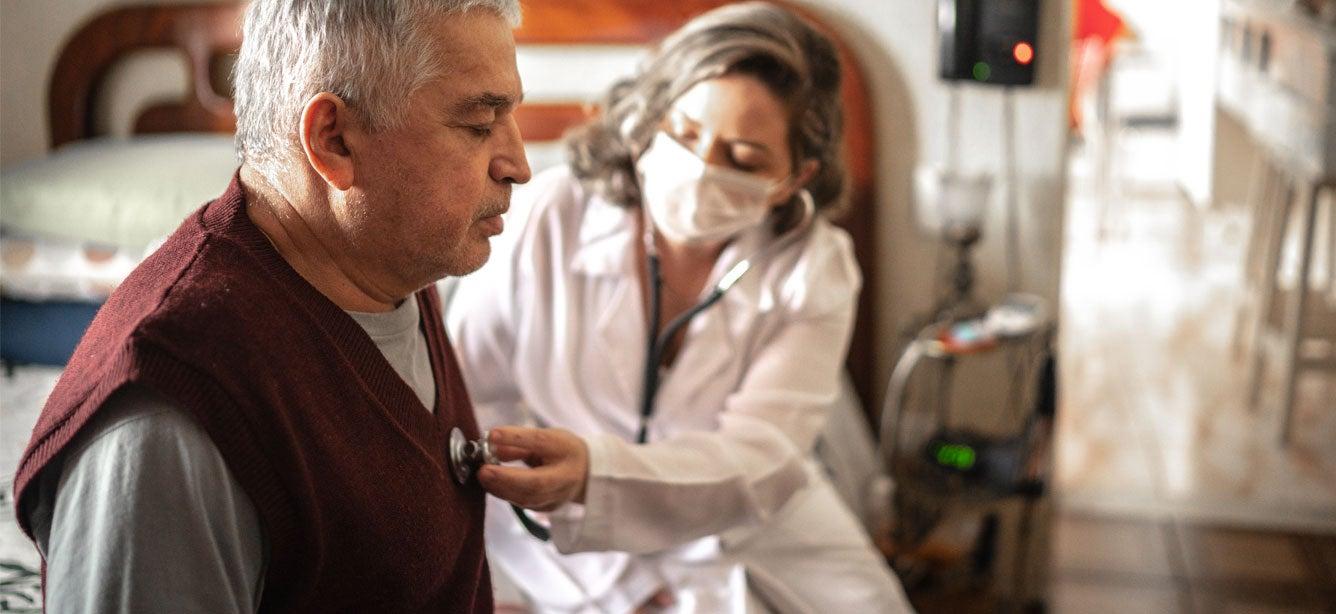
Related Topics
Experiencing a health emergency, like an injury from a fall or a heart attack, often requires hospitalization. While your hospital stay may only be for a short time, you may need assistance when you return home. Medicare can provide home health care services to help you during your recovery.
If you’re wondering “Is home health care covered under Medicare Part A or B?”, the answer is yes—it’s covered under both. Under Medicare Part B, you qualify for home health care if you’re homebound and require skilled care—even if you haven’t been previously hospitalized. In certain cases, such as after a hospital stay or time spent in a skilled nursing facility, you can receive home health care coverage under Medicare Part A.
What exactly is home health care? This type of care is meant to provide health services and equipment to individuals while they are recovering at home. Home health care includes a wide range of health and social services delivered in the home to treat illness or injury. What home health is covered by Medicare? Services covered by Medicare’s home health benefit include intermittent skilled nursing care, skilled therapy services, and care provided by a home health aide.
What are Medicare's criteria for providing in-home nursing care?
1. To qualify for home health care, you must meet the following criteria:
- Be considered homebound based on the Centers for Medicare & Medicaid (CMS) criteria,
- Require skilled care on a part-time or intermittent basis to improve, maintain, prevent, or further slow your health condition,
- Be under the care of a nurse practitioner, clinical nurse specialist, physician’s assistant, or doctor, who completes and documents an in-person visit with you either:
- three months before the start of home health care, or
- within one month after the home health care benefit has begun.
- Receive home health care from a Medicare-approved home health agency.
But what exactly does that mean? Well, let’s say you end up in the hospital after a fall and get surgery on your knee. After spending at least three days in the hospital, it’s time to get discharged, but you have not completely healed. The discharge documents from your physician will include information about you being homebound and needing short-term skilled care. The documents will also include a plan of care that notifies Medicare and health care agencies of the services and equipment you will need while being cared for. Once this happens, you are now eligible to receive home health care from a Medicare-approved agency. Using a home health agency that’s certified by Medicare can help you reduce your out-of-pocket costs.
How long will Medicare pay for home health care? Under Medicare’s rules, you qualify for home health services if you need intermittent skilled nursing care. This is defined as care that’s needed fewer than 7 days a week, or less than 8 hours a day for up to 21 days. There is a three-week limit on care that may be extended if your doctor can provide a good idea of when you’ll no longer need daily skilled nursing care.
You aren’t typically eligible for Medicare home health benefits if you need full-time skilled nursing care for an extended time period.
2. Medicare only covers care for specific services.
If you are eligible for home health care, you can receive skilled nursing care and rehabilitative care services from approved home health care agencies. These services include physical therapy, occupational therapy, speech-language pathology services, medical social services, medical supplies, and other services provided in your home. Recent changes to the law may allow for the increased ability to use telehealth.
If there are any home-based services that Medicare will not cover, your home health agency must advise you in writing through something called an Advance Beneficiary Notice of Noncoverage (ABN). If you disagree with Medicare’s decision to not provide coverage, you may be able to file an appeal.
While you’re recovering at home, you may require certain assistive equipment such as a wheelchair or walker. Medicare also covers durable medical equipment—typically 80% of the Medicare-approved amount—as long as it meets certain criteria. You can often get the equipment you need through your home health agency and get it delivered directly to your door.
3. If you are enrolled in Original Medicare, you pay nothing for home health care services.
However, you may be responsible for 20% of the Medicare-approved amount for durable medical equipment and the standard Part B deductible applies. Costs and benefits may be different for beneficiaries enrolled in Medicare Advantage plans, so check with your plan to find out how they provide Medicare-covered home health benefits.
Ask the home health care agency about what services Medicare will pay for and what is not covered, as some agencies may recommend services not covered by Medicare. Home health agencies must notify you of the cost of services in writing before starting care.
4. Custodial care (long-term care) is non-skilled personal care.
Are home care (vs. home health care) services covered by Medicare? The answer is no. Non-skilled personal care includes activities of daily living (ADLs) like bathing, dressing, eating, chores, and health-related care that most people do on their own, like taking insulin. Agencies that offer these services are referred to as home care agencies, not to be confused with home health care agencies that offer home health care services.
5. Medicare does not cover custodial care or nursing home care.
Medicare’s home health care benefit is not a long-term services and supports program, and it does not provide unlimited coverage. If your care includes any of the following services: 24-hour care, meal delivery, homemaker services, and/or personal care Medicare will generally not cover the cost. Medicaid sometimes pays for services to keep seniors in their homes. The services covered and requirements for enrollment vary by each state’s Home and Community Based Services program.
6. Some states offer custodial care programs for older adults.
Programs like adult day health care, chore assistance, and homemaker services are offered by some state Medicaid programs. Vouchers may also be available for low-income households who qualify.
If you need help locating these programs, we recommend trying BenefitsCheckUp®, a free, online screening tool from NCOA. This tool screens for thousands of money-saving programs, including local respite care, adult day care, and state Medicaid programs. We also recommend contacting your local State Health Insurance Assistance Program (SHIP) for free, federally funded Medicare counseling.
7. It’s important to know the difference between home health care and home care.
Even with all this information, differentiating between home care and home health care can be confusing. Below is a chart to help highlight some of the major differences and similarities in services covered, enrollment requirements, and payment options.
| Home Health Care | Home Care | |
|---|---|---|
| Original Medicare approved | Yes | No |
| Medicare Advantage approved | Yes, may vary depending on insurer | No |
| Medicaid approved | Depends on state | Depends on state |
| Covers long term care | No | Yes, if specified |
| Skilled nursing | Yes | No |
| Rehabilitation therapy | Yes | No |
| Meal preparation | No | Yes |
| Activities of daily living (bathing, grooming, etc.) | No | Yes |
| Requirements for enrollment | Yes | No, unless enrolling in a Medicaid funded program |
Questions about home health coverage through Medicare?
What home health is covered by Medicare? How long will Medicare pay for home health care? If you have Original Medicare and have questions about your home health care benefits, visit Medicare.gov, or call 1-800-MEDICARE (1-800-633-4227). If you receive your Medicare coverage through a Medicare Advantage (Part C) plan, call your insurance carrier directly.
We also recommend contacting your local State Health Insurance Assistance Program (SHIP) for free, federally funded Medicare counseling.




